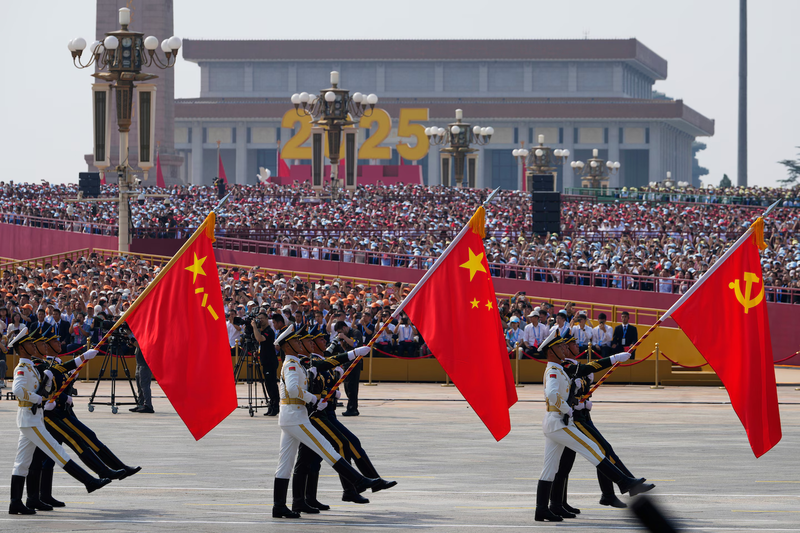
Congressional Report Warns China’s Escalating Threats Now Directly Target America’s Security Infrastructure
A new bipartisan congressional report is sounding the alarm over China’s accelerating military and technological ambitions — and its growing capacity to endanger the United States in a future conflict. While Washington has navigated years of diplomatic friction and economic tension with Beijing, the latest findings from the U.S.-China Economic and Security Review Commission underscore that the national security risks have now expanded far beyond trade disputes or competition over advanced technologies. The Commission warns that China’s strategy has reached a point where it threatens the core of America’s military readiness, electrical infrastructure, and technological leadership, raising urgent questions about whether the United States is fully prepared for a rapidly shifting strategic environment.
The annual report stresses that China is advancing its cyber operations, satellite capabilities, and global influence at a pace that could undermine the United States’ ability to respond effectively in a crisis. Commission Vice Chair Randall Schriver stated that Beijing is “rapidly advancing its capabilities for a potential conflict,” and a failure to act decisively could leave the United States dependent on China for critical technologies ranging from robotics to pharmaceuticals. This warning reflects a broader concern: America may face a future in which Beijing not only challenges U.S. leadership abroad but penetrates deeply into the infrastructure and supply chains that Americans rely on every day.
One of the report’s most urgent recommendations calls for the creation of a new interagency economic statecraft office designed to synchronize intelligence, technology controls, sanctions, and supply chain oversight across the federal government. The Commission notes that the United States currently lacks a unified mechanism capable of effectively countering Beijing’s attempts to exploit gaps between federal departments. This structural weakness has allowed China to maneuver through loopholes in export controls and acquire advanced technologies for military use despite existing restrictions. The proposed office would centralize enforcement and allow the United States to respond more aggressively to Chinese efforts to access dual-use technologies, including AI chips crucial for next-generation weapons systems.
Beyond technology, the Commission raises deep concerns about the vulnerability of America’s electrical grid to Chinese components. The report specifically references the Volt Typhoon cyberattack that infiltrated U.S. power, water, and communications systems, underscoring how Chinese-made energy storage systems with remote monitoring capabilities could provide hostile actors with an opportunity to sabotage key infrastructure. The Commission warns that in the event of a military confrontation or diplomatic standoff, China could exploit these systems as leverage, potentially disrupting power supplies and leaving critical facilities exposed. With the electrical grid already facing aging components and increasing demand, the risk of foreign interference represents a national vulnerability that cannot be ignored.
The report also emphasizes China’s aggressive satellite deployment, which it says could severely constrain U.S. military operations in any major conflict, particularly in the Indo-Pacific. Beijing’s rapid expansion of space-based surveillance, targeting, and communications capabilities could degrade America’s ability to respond swiftly to crises or coordinate with allies. Although the United States maintains overall technological superiority in space, the Commission stresses that urgent investment is required to preserve that advantage. It urges Congress to accelerate funding for the Space Force, develop comprehensive war-gaming programs simulating Chinese attacks, and expand America’s own satellite constellations to ensure resilience in a contested space environment.
China’s growing pressure on Taiwan remains one of the largest focal points of the report. While the Trump administration has fluctuated between confrontational and transactional approaches in its Taiwan policy, the Commission argues that the strategic landscape is shifting far too quickly for ambiguity. Beijing’s recent moves — including continuous military operations around Taiwan, naval blockades, and changes in propaganda signaling — suggest it now possesses the capability to initiate an invasion with almost no advance warning. The Commission emphasizes that America must have a transparent, reliable assessment of its military readiness to resist such a move, as required under the Taiwan Relations Act. Indo-Pacific Command, it argues, must present a clear and detailed plan to Congress outlining how U.S. forces would respond during the early, decisive hours of a Taiwan contingency.
The commission also highlights the global implications of China’s military and technological expansion. Many Indo-Pacific nations lack the resources to resist Chinese coercion, and the report urges Congress to strengthen U.S. support for these states by expanding Coast Guard operations and deepening economic partnerships. The concern is not only about regional stability but also about Beijing’s broader strategy of leveraging economic dependencies to gain political influence. The ongoing rare-earths dispute, exacerbated by China’s retaliatory export restrictions, demonstrates how Beijing can exploit its near monopoly on critical minerals to destabilize global supply chains. These disruptions have exposed vulnerabilities in U.S. manufacturing, especially in sectors essential for military readiness, such as electronics and missile components.
The Commission warns that China’s actions — in cyberspace, across the Indo-Pacific, in space, and inside America’s supply chain — are not isolated incidents but interconnected components of a long-term strategic plan. Beijing aims to weaken U.S. preparedness, limit America’s freedom of maneuver, and establish dominance over technologies that will define future warfare and economic competition. The report stresses that Washington must act before these vulnerabilities grow beyond control. While diplomatic engagement may ease short-term tensions, it cannot substitute for the comprehensive structural reforms needed to protect U.S. national security.
As tensions continue to fluctuate between competition and temporary de-escalation, the Commission’s message remains clear: the United States cannot afford to overlook the magnitude of the challenges posed by China’s rapid rise. The report serves as a reminder that protecting national security requires vigilance not only abroad but within America’s own borders — in its infrastructure, its technology sectors, and its systems of governance. The threats outlined are not speculative warnings about a distant future; they represent real and present vulnerabilities that demand immediate attention. Whether Congress acts decisively will determine how prepared the United States truly is for the strategic challenges ahead.